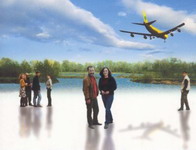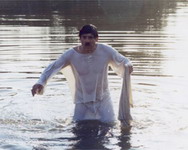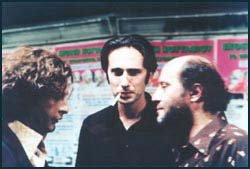by Andrew Horton
“What we need today is no less than a revolution. We
need
to do violence to the cliché, create havoc
with the tried, the
tired, and
tested."
Larry Gelbart
During the summer of 2002, Variety, that clear
“voice” of the American film industry, noted a new trend
that is occurring globally: Hollywood sales and rentals
have begun to fall about 7% ($2.2 billion) each year due
to the increasing popularity of “local” films (Dawtrey 1).
Repeat: Hollywood is now losing money as filmmakers
in countries such as France, Denmark, Germany, Holland,
Spain and Norway are making films home audiences want to
see in large numbers.
But such is not the case yet in Greece. Why this is
so and what can be done about it is the theme of this
brief glance at one aspect of contemporary Greek cinema.
Let’s begin with the growing awareness of many young Greek
filmmakers of their situation: “I want to make good
films in Greece like they do in Ireland from My Left
Foot to The Crying Game. You know, films
that have a large home audience and go on to play in
cinemas around the world as well as gather a multitude of
festival awards,” one young Greek filmmaker told me in
Athens recently. But he was not alone. Another
used “Iran” instead of Ireland as her cinema of admiration
from a “small country” that has a number of filmmakers who
know how to tell a local story like White Balloon
that plays globally. And at least three other
filmmakers had a question for me the summer of 2002,
knowing that I have written scripts for Yugoslav films and
teach screenwriting around the world: “Why can’t we
Greeks make films as powerful as this year’s Oscar winning
“foreign film”, Ademir Tanovic’s No Man’s Land from
Bosnia?”1
It’s a clear fact that contemporary Greek cinema is not
suffering from a lack of talent. Any representative
cross section viewing of recent Greek films by new,
maturing, and/or well-seasoned directors such as Pandelis
Voulgaris, Nikos Panayotopoulos and Theo Angelopoulos
suggests a surprisingly diverse field of styles,
approaches, narratives and themes. But as Greek
filmmakers themselves are becoming increasingly aware, the
overreaching weak point in most of these projects is the
screenplay. I am writing this essay as a
screenwriter and international script instructor and
adviser for screenwriters in countries from Norway and
Hollywood to New Zealand, and South Africa as well as
throughout Europe including Hungary, the Czech Republic,
Yugoslavia and Bulgaria myself, with a long familiarity
with Greek cinema. My intent is to take a brief look
at five promising recent Greek films and I also wish to
look into the near future and what can be done to
strengthen the forming and “telling” of strong Hellenic
tales on film. The films under consideration include
Renos Haralambidis’ second feature Cheap Smokes
(Ftina Tsigaras, 2000), Christos Dimas’s first
feature, The Cistern (Akrovitis Tou Kipou
2001), Constantinos Giannaris’s third feature, One Day
In August (Dekatpendavgustos, 2001),
Andreas Pantzis’s third feature, Evagoras’ Vow
(To Tama, 2001), and Sotiris Gortsas’s third
feature Brazilero (2001).
Not all of these recent films have received a general
release in Greece as this essay is being completed in
2002. But of the films that have, none has done well
at the home box
office,2 and
certainly unlike this year’s Bosnian Oscar winner, No
Man’s Land, none of the group has had an international
popular distribution. There is, however, much
to celebrate as we shall see, and the future does suggest
that Greek filmmakers are beginning to take screenwriting
more seriously.
FIVE EASY SCENES & FIVE HARD NARRATIVES
Consider five strong moments from our films under
consideration that suggest these are
filmmakers/screenwriters who should be taken seriously.
Sotiris Goritsas has an impressive track record with his
debut film From the Snow (Ap’ To Chioni,
1993) about Albanian Greek immigrants trying to make in a
Greece hostile to anyone speaking Albanian, and with his
second film, Balkanisaeur (l995) which is a well
told road movie of two Greeks making money by working
scams between Bulgaria and Switzerland. His latest
effort, Brazilero has a fine set up as “Euro
inspectors” descend on a Greek country town to check on
whether Euro-cultural funds have been well spent by our
leading Greek characters.
Nothing could be so on target and up to date in dealing
with how Greece and Greeks fit or don’t fit into the “new
European order”. I do not wish to give away the conclusion
of Goritsas’s social satire in Braziilero, but a
brilliant scene is when the inspectors, one a Dutchman and
the other an Italian, discover that the so-called cultural
center that the European funding was supposed to build is
a half finished frame of a large structure far out on the
edge of town. But not only is the structure
not finished, it is actually full of refugees from a
variety of Balkan and Middle Eastern and African
nations. This scene alone in which the inspectors
are forced to decide if this is a “violation” of the
funding or actually a creative re-direction of what is
meant by a “cultural center” wins our hearts and our
respect for Goritsas’s cinematic and narrative
vision. That said, much of this 95 minute film drags
and the cross cutting between personal stories and that of
the cultural center and its inspectors lacks a clear sense
of narrative cross cutting and character development.
Andreas Pantzis has a strong background in both
documentary and feature films including two previous
features, The Rape of Aphrodite (1985) and
Rape of the Cock (1996). He also has a
special perspective on cinema having graduated in film not
in his native Cyprus but from the much acclaimed film
school in Moscow. Evagoras’ Vow, his
recent film is an extremely ambitious historical epic of a
simple Cypriot peasant son of a local priest who, just
before World War II begins, sets out to thank a Saint in a
monastery for delivering him a son in a family of five
daughters. This finely photographed and
orchestrated “odyssey” at a time of great social and political upheaval
could have become, with a stronger script, a
personal epic that pulls in audiences everywhere like
Homer’s tale if we were made to care more about our main
character. But while Pantzis succeeds in capturing
historical atmosphere, costumes and textures, he loses his
main character in his overly complicated mixture of
everything from Nazi troops to British forces.
Several I have talked to who have seen the film said that,
ultimately, they simply couldn’t follow the story
and frankly didn’t care by film’s end.
One Day In August follows in the timely
current multiple narrative mode of Pulp Fiction,
Run Lola Run and Beautiful People by
tracking four different contemporary tales of
Athenians in one apartment building taking off for their
August holidays. With complicated chance crossings
of narratives, the main
“thread” is actually a lonely seventeen year old boy who
breaks into the apartments and lives out a series of
“costumed” fantasies in these vacant “worlds.” The set up is very compelling
and promising. And yet by journey’’s end,
director/writer Constantinos Giannaris has spread himself
so thin, that each character becomes a caricature rather
than the more rounded figures we were hoping would
emerge.
In The Cistern Christos Dimas has etched an
extremely poignant “coming of age” story of about a group
of eleven year old boys in Eleusina in l974 that ends in
the drowning death of several of the boys. Like
Truffaut’s 400 Blows, Dimas’ first feature captures
the joys and also the muddled lives of the surrounding
family members and other adults, all seen from a youth’s
point of view who is torn between the old gang and the
world of adulthood that awaits him. The narrative
spine breaks down, however, in cross cuts to a number of
subplots including quite surrealistic “ancient” brothers
related to a “curse” cast early in the film. Less
would have been much more here, even though there is no
mistaking the depth of emotion and character traits
explored in the young boys. Memorable moments
include those of the boys playing dangerous diving games
at an old water tank (cistern) which has a huge industrial
fan underneath it, and also moments of the boy at home
dancing and playing with his mother and working on
drawings underneath the furniture in his home.
Finally Renos Haralambidis’s follow up to his popular
first film, No Budget Story (1997), Cheap
Smokes is an offbeat romantic comedy set in Athens on
a single summer night as a young man (played by
Haralambidis) falls in love with a young woman he
meets at an outdoor phone booth. Haralambidis
has some very fresh scenes including the phone booth
meeting as “he and she” are at side by side phones talking
to each other before she “gets” that the voice on the
other end is the handsome young man beside
her. The closing sequence manages nicely to
“jump” the film into a level of magic romantic realism as
the streetcar the young couple is on “fills” with flying
pigeons and doves. But rather than opening up this
romance and the two main characters, Haralambidis has
added so many minor figures—mostly a carnival of
frustrated men of various ages and backgrounds---that the
main story and lovers are almost lost in the shuffle of
monologues and mini scenes.
All five and many more Greek films of the past thirty
years are in need of a strong rewrite to bring out the
splendid promise that each film evokes. Yet before we can
talk about improving the screenwriting scene in Greece, we
need to review its history.
GREEK SCREENWRITING INSIDE OUT
Greek screenwriting can be broken down into roughly two
major periods: the Greek “studio” cinema of the 1950s and
early 60s and the post 1967 “New Greek Cinema” and beyond
up to and including the present.
Screenplays during the 1950s and early 60s worked
effectively for several reasons. First, Finos Films
and the other studios were basically working in several
well-defined genres, most specifically, musicals,
light comedy, and village melodramas (Malandrakis
53). And genre on the one hand provides simple
frameworks of expectations for writers and audiences while
thus allowing the writer to “play” with the genre
conventions to come up with new plot twists, clever
character variations, and imaginative reworkings of tried
and true tales (Horton Writing the Character
Centered Screenplay 26).
But particularly in the case of light comedy and musicals,
the Greek tradition of what Americans would call
vaudeville theater—epitheorisis in Greek—was also
important for films starring such icons of the Greek
screen as Thanasis Vengos and Aliki Voulyaklaki. In
this sense, Greek cinema of this period was much like
Hollywood in the l930s and early 40s. In California
at that time, musicals and comedies often starred
vaudeville and musical theater vets such as the Marx
Brothers, Mae West and W.C. Fields and the writers also
came to Los Angeles with such “hands on” background.
In Greece, even such renowned director/writers as Michael
Cacoyannis came to screenwriting with a firm understanding
of these Greek genres and of ancient theatrical structures
too.
Yet with the coming of the New Greek Cinema of the late
1960s that coincided with the coming of the Junta
Dictatorship of 1967, filmmakers broke away from the old
genres of Greek film and, influenced by everything from
the French New Wave and the German New Waves to East
European films such as those from Hungary, Poland and
Czechoslovakia, began writing their own scripts in their
own way. On the plus side the late 1960s and
70s found Greek audiences lining up to see Greek films
that took on subject matter never before explored on the
screen such as Theo Angelopoulos’ surprise box office
smash hit, O Thiasos (The Travelling
Players 1975) that examined, in part, the Greek
Civil War of 1945-49 from the perspective of the Left
(Horton. The Films of Theo Angelopoulos
103).
And yet the negative effect of this “auteur” approach to
cinema with most of the directors acting as screenwriters
too, was that more and more films began to be written and
shot that perhaps played a film festival or two such as
the Thessaloniki Film Fest, and never opened commercially
in an actual cinema.
While on the other hand, dozens of films since the mid 70s
that have made it into cinemas briefly seldom gathered
more than 10,000 ticket sales in their first run.
But the Greek screenplay of the past thirty years has been
hurt as well by two important elements that have been
missing in Greece. First is the lack of strong script or
film school programs that are available in other countries
and, second, a lack of what I would call a script
environment of “cross fertilization” and
mentorships. Emir Kusturica of Bosnia/Yugoslavia,
for instance, is typical of so many of the award winning
and popular Yugoslav filmmakers of the 80s and 90s in that
they had the chance to study film at one of the best film
schools in the world during the 60s and 70s: The
FAMU Film School in Prague where teachers included Milos
Forman and Milan Kundera among others.
No strong film program or school has yet developed in
Greece even though a few commercial “schools” have come
and gone such as the Stavrakos School in Athens. And
certainly no screenwriting program of any note has been
ever available in Greece. Fortunate filmmakers have
managed to study abroad, however, and taken script
programs offered in London, Paris, Australia, and the
United States, for instance. But the need for a well
structured and staffed script and film program is a
pressing need for Greece. In the next section we
will turn to signs that such possibilities may begin to
exist soon.
Secondly, there is a need for a richer sense of a “script
culture” and cross fertilization between filmmakers.
Filmmakers I talk to in Greece speak of how much they
basically work alone or with only one or two
friends. The idea that screenwriters and filmmakers
would actually help read and even write and rewrite and
analyze each other’s work is not a reality in the
Greek film world
as my research suggests. But in other countries, a
richly supportive script community or set of communities
has evolved. Take the French New Wave, for
instance. Remember that Godard and Truffaut began
their careers helping each other on their scripts and
their filming. Similar stories have emerged about
filmmakers and screenwriters in a number of East European
countries, in Hong Kong, and New Zealand to name but a
few. When I started working with Srdjan Karanovic in
Belgrade in the 1980s, I was immediately impressed that
his friend
Rajko Grlic of Zagreb helped write some of his early films
while he did the same for Grlic, And that other members of
the “Prague Group” including Emir Kusturica often read
each other’s work, gave feedback, shared actors and
resources. Thus instead of isolation and a sense of
competition, there was a feeling of accomplishment for the
whole “film community” when one film became a local hit or
picked more festival awards. Kusturica, for
instance, in accepting a Cannes Fest award for When
Father Was Away On Business in l985 said, in his
acceptance speech, that the award really should go to the
whole “Prague group in Yugoslavia.” Ademir Tanovic
in Bosnia has grown up in this very same script and film
culture in making No Man’s Land that has in large
part transcended political barriers and the recent wars in
the former Yugoslavia. Los Angeles
Times critic Kenneth Turan commented on such a
mutually helpful environment that he realized existed in
the Balkans, especially before the wars of the past
decade, during his visits after the Bosnian war to
the Sarajevo Film Festival in 1997 in Sundance to
Sarajevo: Film Festivals and the World They Made.
Building such a sense of cooperation, sharing and mutual
support in screenwriting in Greece will, of course, take
time, energy and a sense of dedication on the part of
individuals willing to reach out and help each
other.
NEW TRENDS IN GREEK SCREENWRITING
There are changes afoot in Greece that suggest a brighter
future for Greek screenwriters and films. Let us
specifically consider two important breakthroughs:
the increased contact between screenwriters and filmmakers
throughout the Balkans because of a new organization, The
South Eastern Europe Cinema Network, and the beginning of
European Union funded seminars bringing together
screenwriters and expert professors from all over the
world with Greek screenwriters participating too.
Formed in 2000, the South Eastern Europe Cinema Network
Film was initially set up through the help of the Greek
Film Center to bring together filmmakers, producers,
distributors and screenwriters from Greece, Cyprus,
Turkey, Albania, all of the former Yugoslav republics,
Bulgaria and
Romania.3
The potential for such cooperation and coordination on
workshops, conferences, and even co-productions is
enormous and long overdue. I personally remember the
excitement generated at an earlier attempt to start up a
Balkan Film League at the Belgrade Film Festival of
l996. Representatives from all of the above
countries sat at the same table in a restaurant beside the
Danube sharing stories, toasts to each other, and simply
“talking film”, the language they all understood.
This new Association is beginning to talk about the need
for “script development” projects. The idea would be
for screenwriters to be chosen from each of the
participating countries to meet on a regular basis for
seminars and script development sessions. One hopes
that such meetings will begin as early as 2003.
Similarly, script development seminars have already been
funded by the European Union Media Program. Perhaps the
most successful branch of this program have been the
seminars called Sources and Sources 2. The Sources
programs, directed by Renate and Marion Gompper
located in Berlin, team well known screenwriters with
groups of no more than five screenwriters who apply, each
from a different country and each bringing with them a
producer attached to their project in
development. The idea is to meet initially in
one location for a week and then several months later when
the scripts are completed at another city, most often that
of the instructor.
Several Greek films including Pericles Hoursoglou’s
The Man In Grey (1997) grew out of this useful
example of international cross fertilization.
Again, speaking from personal experience, I have found
such an approach extremely inspiring on many levels.
The Sources seminar I conducted (1999) was on writing
comic scripts and met for the initial week in Cologne,
Germany. My participants were from Ireland, the
Netherlands, England and Austria. The follow-up
meeting in which we read each other’s completed works and
commented on them occurred four months later in
London. What I think happens very quickly in such an
environment is that writers stop thinking of each other as
“Greek”, “Dutch”, “American” or “Irish” and see and hear
each other as simply, SCREENWRITERS! Thus the
politics of having to deal with writers/filmmakers from
one’s own country go out the window and one is free to
honestly be receptive to other influences, critiques,
suggestions.
With the summer of 2002, a Media sponsored program with a
similar structure but with a much larger cast (20
screenwriters) was assembled on the island of Nisseros in
July. The follow up session is scheduled for October
on the island of Samos. Once more, the
screenwriters are from all over Europe with five coming
from Greece. In talking with several participants,
they noted that the cross-national influences, especially
of simply hanging out with other screenwriters, more than
made up for the limitations of having such a large group.
CONCLUSIONS AND NEW BEGINNINGS
There is no one way to write a successful screenplay
(Horton Writing The Character-Centered Screenplay
2), It is, however, possible to suggest approaches,
exercises, and a wide range of samples of films, stories
and characters that can help strengthen an individual
writer’s work. And it is my feeling based on all we
have discussed above that in the next few years we will
begin to see an exciting variety of films that more fully
connect with local and international audiences.
A few such films have already begun to emerge. In
closing, let us mention one: Chios born
director Dimmos Avdeliodis’s first film The Four
Seasons of the Law (1999) is what New York based
critic Dan Georgakas calls, “a comedy that has something
to say about country life and governance in Greece” (6
). With a rave review in Variety and popular
screenings at festivals around the world as well as a
respectable home box office in Greece, Avdeliodis is a
writer/director to watch. In following four rural
police assigned to supposedly godforsaken village on Chios
during four different seasons, they and thus we the
audience come to know the characters, customs, quirky
habits and charming nature of this “backwater” area of
Greece. Avdeliodis succeeds in his script and in his
direction to build on what he knows—his home island of
Chios—with a carnivalesque sense of both character and
narrative that leaves us feeling we have been pulled into
another world and enjoyed it for the almost three hours he
holds our attention.






